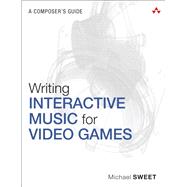
Writing Interactive Music for Video Games A Composer's Guide
- ISBN13: 9780321961587
- ISBN10: 0321961587
- Edition: 1st
- Format: Paperback
- Copyright: 2014-09-22
- Publisher: Addison-Wesley Professional
-
Your order must be $35 or more to qualify for free economy shipping. Bulk sales, PO's, Marketplace items, eBooks and apparel do not qualify for this offer.








